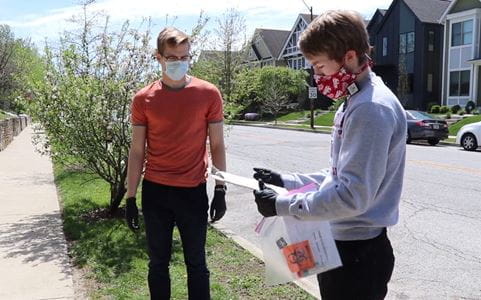INDIANAPOLIS – A study conducted by Indiana University School of Medicine researchers has shown that asymptomatic COVID-19 infection is possible in children younger than 10 years old.
The researchers have shared the results of their novel COVID-19 study of asymptomatic children and adults in Marion County known as TACTIC (Tracking Asymptomatic COVID-19 Through Indianapolis Communities).
The study results showed that only one of the 511 individuals tested had the active COVID-19 virus. Interestingly, the individual is a 7-year-old child who lives with five other people who were also tested for COVID-19. None of the other people living with that child had COVID-19 symptoms or tested positive for the disease. The infection rate seen in TACTIC—0.2 percent—is consistent with the results observed in the statewide study conducted by the IU Fairbanks School of Public Health around that same time (April-May 2020).
“One of the major takeaways of this study is that there can be asymptomatic COVID-19 infection in children in the community who are younger than 10 years old,” said Chandy John, MD, one of the study’s co-leaders who is also the director of the Ryan White Center for Pediatric Infectious Disease and Global Health at IU School of Medicine. “Additionally, we now know that asymptomatic infection can occur in young children with no known contact to the virus, and they do not necessarily spread it to others. Community studies in other countries have not found this.”
TACTIC is the first known study in the United States to evaluate asymptomatic COVID-19 infection in both children and adults in a community, rather than contacts of infected people (contact tracing) or people coming into the hospital. The study participants reflected the demographics of Indianapolis, including gender and minority populations. Most of the participants had no known exposure to the virus.
“The overall prevalence of participants with asymptomatic infection was low, which shows us the state-implemented social distancing measures have significant benefits,” said James Wood, MD, the study’s other co-leader, who is also is an assistant professor of pediatrics at IU School of Medicine and an infectious disease doctor at Riley Hospital for Children. “Even though there was no obvious spread of the COVID-19 infection from the child who tested positive to family members, more research needs to be done to learn about the risk of transmission through children.”
The people who were selected to participate in the study self-administered the nasal swabs from the safety of their own home. IU School of Medicine student volunteers dropped off and picked up the test kits, which minimized person-to-person interaction. The Centers for Disease Control and Prevention have determined that nasal swabs are acceptable ways to collect COVID-19 samples, clarifying that nasopharyngeal swabs are not preferential over nasal swabs, as was previously suggested.
“Most of the research currently being done about COVID-19 focuses on the impact of the virus on adults, not children,” said John. “Now more than ever, as parents across the country have been struggling with the decision of whether to send their children back to school, it is important to encourage researchers to do studies that involve people under the age of 18. We need to learn how to handle the pandemic moving forward in a way that keeps children safe.”
The researchers shared the results of each test with the participants. They also sent the overall study results to those participants this week. The findings were published in the medical journal, Cureus.
“While we are happy to be able to share the results of TACTIC, we know this study is just the first step in helping researchers understand how COVID-19 can affect families, and especially children,” said Wood. “We’re already looking ahead to see how we can learn more about the coronavirus and the ways the disease spreads through our communities.”
All IN for Health volunteers were among the first people invited to participate in the TACTIC study. Recruitment was complete in just 20 minutes, with a lengthy waitlist, and the first round of enrollment was done within 24 hours of the study announcement.
###
About IU School of Medicine
IU School of Medicine is the largest medical school in the U.S. and is annually ranked among the top medical schools in the nation by U.S. News & World Report. The school offers high-quality medical education, access to leading medical research and rich campus life in nine Indiana cities, including rural and urban locations consistently recognized for livability.
About All IN for Health
All IN for Health, a program of the Indiana Clinical and Translational Sciences Institute (CTSI), is designed to promote good health through the sharing of health resources and participation in health research.
About the Indiana CTSI
The Indiana CTSI brings together the state’s brightest minds to solve Indiana’s most pressing health challenges through research. It is a statewide partnership among Indiana University, Purdue University, the University of Notre Dame and numerous life sciences businesses, government entities, and community organizations. The Indiana CTSI engages with the public at every level of research—from basic science to patient care. It has been continuously funded by multimillion-dollar grants from the National Institutes of Health since the Indiana CTSI’s founding in 2008 and is housed at the IU School of Medicine.




